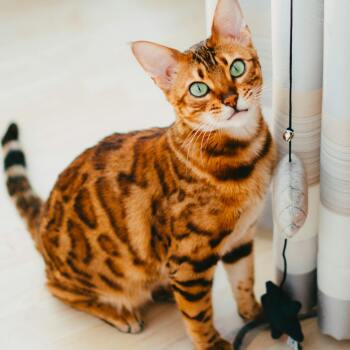Bengals

Who Dey? More like what dey—because if you've got a Bengal cat at home, you're living with a one-of-a-kind feline MVP. Just like their football namesakes in Cincinnati, these Bengals are agile, flashy, and never boring to watch. They're the purr-fect mix of wild energy and homegrown charm.
What Makes Bengals Unforgettable?
- Playfulness is Their Middle Name: Bengals don’t just nap in the sun—they want to play! Be ready for fetch, chase, and all-out zoomies.
- Brainy Furballs: Teaching tricks to a cat? With a Bengal, it’s not only possible—it’s expected.
- Sky-High Ambitions: Tops of fridges, curtain rods, and cabinets are all fair game. Bengals like their views with altitude.
- Social Butterflies: These aren't your average aloof cats. Bengals are outgoing and often greet guests like they’re running for mayor.
- Cool with the Crew: Bengals usually do well with kids and other pets, as long as everyone respects their energetic vibe.
Some Quirks to Keep in Mind:
- Vocal About It: Bengals love to “talk,” often in meows, chirps, and howls that rival a stadium crowd.
- Creative Decorators: A bored Bengal might “redecorate” your countertops—or your couch.
- Hunter Mode: With a strong prey drive, they love to chase anything that moves (yes, toes included).
- Territory Marking: Breaking a marking habit requires patience and a solid cleaning routine.
- Hands Off, Please: Some Bengals don’t love being picked up, preferring to be the boss of their own paws.
So, Is It All Worth It? Absolutely! With a Bengal, you're not just adopting a cat—you’re drafting a star player into your family team. Their electric personalities and affectionate moments make them unforgettable companions.
A Bit of Backstory
Bengals are a uniquely American breed, developed by mixing domestic cats with the Asian Leopard Cat to combine exotic looks with affectionate temperaments. The result? A wildly stunning cat that acts more like a sidekick than a lap pet. But early socialization is essential, especially if your home already includes other animals. Bengals thrive when mentally and physically engaged—so think enrichment toys, climbing trees, and plenty of play.
Genetic Predispositions for Bengals
- Patellar Luxation—This condition, where the kneecap slips out of place, can cause a noticeable “skip” in their step. It’s often caught during early vet visits and can be treated with anything from joint supplements to surgery.
- Hip Dysplasia—Though more common in dogs, Bengals aren’t immune. Malformed hip joints can lead to arthritis. A pelvic X-ray during early checkups can help with early detection.
- Pyruvate Kinase Deficiency (PKD)—This inherited condition affects red blood cells, potentially leading to anemia. A simple genetic test can reveal whether your Bengal is a carrier, helping you plan ahead.
- FIP Susceptibility—Bengals are at higher risk for Feline Infectious Peritonitis (FIP), a fatal illness caused by a mutated coronavirus. Always ask your breeder about any history of FIP and keep an eye out for lethargy or fluid buildup in the abdomen.
- Blood Type Awareness & Neonatal Isoerythrolysis (NI)—Bengals may have rare blood types (B or AB), so testing can be a lifesaver in emergencies. For breeders, knowing blood types is critical to avoid NI, a tragic reaction that occurs when kittens nurse from a mother with an incompatible blood type.
- Progressive Retinal Atrophy (PRA)—This genetic disease causes progressive vision loss and blindness. Symptoms often appear around 18 months. Genetic screening can prevent this from being passed down to kittens.
Ready to Learn More? We’re Here to Help!


